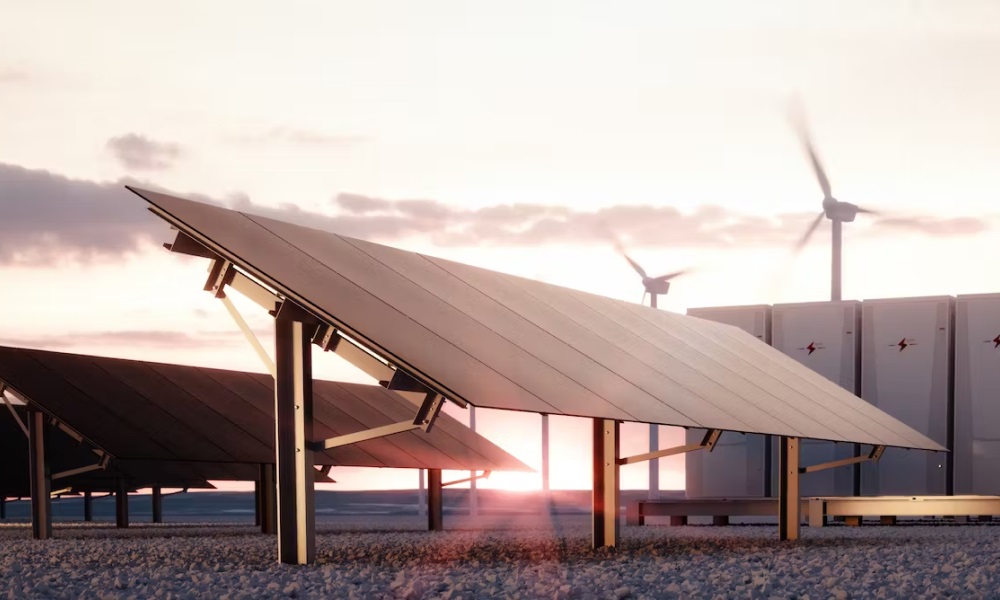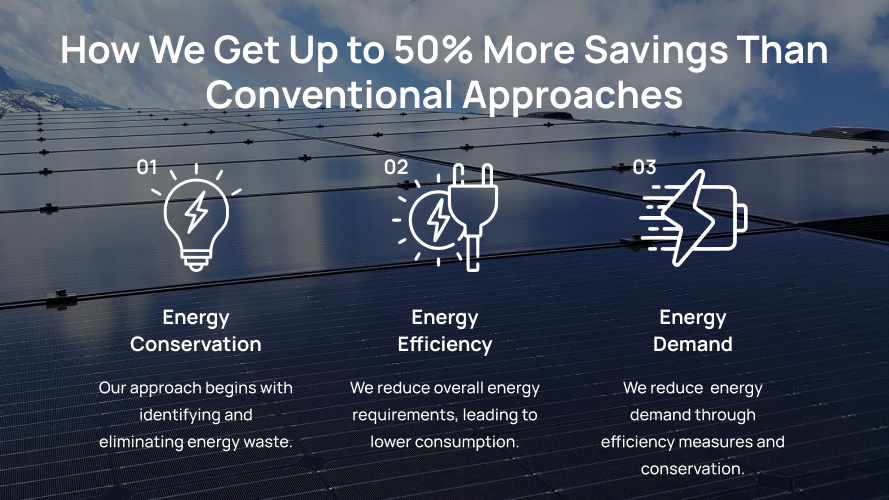Trusted by
Innovative Hybrid Commercial Solar Systems
Enjoy reduced maintenance, lower emissions for your business, and greater savings year after year with an innovative hybrid solar system.
Uniting the best of solar technology, our hybrid commercial solar systems blend grid power with solar energy to optimise efficiency and savings.
Ideal for businesses of all sizes, our solar solutions ensure uninterrupted power supply, even during outages. With Sustainable Savings as your partner, you can benefit from reduced energy bills and contribute to a sustainable future. Our SA-based service offers expert consultation, custom system design, seamless installation, and ongoing maintenance.
Are you ready to empower your business with a reliable, eco-friendly energy source? Experience the advantages of a Hybrid Commercial Solar System today – a smart investment for both your bottom line and the environment.
Learn more by contacting a member of our team on (08) 7120 6366 for an obligation-free quote.
What Are The Best Types Of Hybrid Commercial Solar Systems?
The best types of hybrid commercial solar systems in South Australia typically include configurations that seamlessly integrate panels with battery storage and grid connectivity. These can include:
Grid-tied Hybrid Systems: These systems allow businesses to generate solar energy while also remaining connected to the grid. Excess energy generated during sunny periods can be fed back into the grid, earning credits or revenue, while grid power can supplement solar energy during cloudy days.
Solar with Battery Storage: Integrating solar panels with battery storage enables businesses to store excess solar energy during the day and use it during peak demand periods or during power outages, enhancing energy independence.
Smart Energy Management: Systems equipped with advanced energy management technology can intelligently switch between solar, battery, and grid power based on real-time energy demands and pricing, optimising cost savings.
Backup Power Solutions: Hybrid systems that prioritise backup power ensure business continuity during grid failures, offering a reliable power source in critical situations.
Customised Design: The best systems are tailored to a business’s energy needs, consumption patterns, and available space, ensuring maximum efficiency and return on investment.
Learn more about our leading commercial solar solutions:
What Factors Affect The Cost Of Hybrid Commercial Solar Systems?
The cost of a typical hybrid commercial solar systems in South Australia can vary widely depending on several factors. These factors include the system’s size, capacity, brand and quality of components, battery storage capacity (if included), installation complexity and any additional features like smart energy management systems.
For a more accurate cost estimate tailored to your specific needs, reach out on (08) 7120 6366 for your custom quote.

Hybrid Commercial Solar System Benefits
Energy Cost Savings: By harnessing solar power, businesses can significantly reduce their electricity bills, as they generate their own clean energy, decreasing their reliance on grid power and fluctuating energy prices.
Grid Independence: Hybrid systems with battery storage allow businesses to store excess solar energy for use during peak demand or grid outages, ensuring continuous operation and reducing reliance on the grid.
Environmental Impact: Utilising solar power reduces greenhouse gas emissions, helping businesses contribute to a greener environment and their sustainability goals.
Financial Incentives: Incentives like government rebates, tax credits, and feed-in tariffs can enhance the financial viability of hybrid solar installations, providing a quicker return on investment.
Energy Security: Backup power capabilities ensure operational continuity during power outages, minimising downtime and potential revenue loss.
Smart Energy Management: Many hybrid systems come with intelligent energy management, optimising energy usage by intelligently switching between solar, battery, and grid power based on real-time needs and pricing.
Enhanced Reputation: Demonstrating a commitment to renewable energy can enhance a business’s reputation, attracting environmentally conscious customers and partners.
Long-Term Savings: While the initial investment may seem significant, hybrid systems offer long-term savings over their lifespan, typically around 25 years or more.
Future-Proofing: As energy costs continue to rise, having a hybrid solar system protects businesses from these increases and provides a hedge against future energy uncertainties.
Low Maintenance: Solar systems require minimal maintenance, leading to lower operational costs and minimal disruptions to business activities.
Technological Advancements: Hybrid solar technology is advancing, with improvements in efficiency, storage capacity, and smart features, ensuring businesses stay at the forefront of energy innovation.
What Is The Installation Process For Hybrid Commercial Solar Systems?

Is A Hybrid Solar System Suitable For A Business?
Yes. A hybrid solar system combines the features of both grid-tied (grid-connected) and off-grid (standalone) solar systems, often incorporating energy storage in the form of batteries. Here’s how a hybrid solar system works:
Solar Panels: Like a traditional grid-tied solar system, a hybrid system includes solar panels that convert sunlight into electricity.
Battery Storage: What sets a hybrid system apart is the addition of battery storage. Excess solar energy generated during the day is stored in batteries instead of being fed back into the grid. These batteries can then be used to power your home or business during the evening or when solar production is low.
Grid Connection: A hybrid system remains connected to the grid. This connection serves as a backup source of power when solar energy and battery storage are insufficient, such as during prolonged cloudy periods or high energy demand.
Energy Management: Hybrid systems often include energy management systems that control the flow of energy between solar panels, batteries, and the grid. These systems intelligently decide when to use solar power, when to charge or discharge batteries, and when to draw power from or supply power to the grid.
Backup Power: One of the key advantages of a hybrid system is its ability to provide backup power during grid outages. If there’s a blackout, the stored energy in the batteries can be used to keep critical appliances or systems running.
Hybrid solar systems offer the benefits of grid-tied systems (reducing or eliminating electricity bills, earning feed-in tariffs) and off-grid systems (energy independence, backup power), making them a versatile choice for those looking to optimise their energy usage and minimise reliance on the grid.











